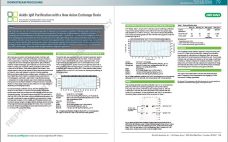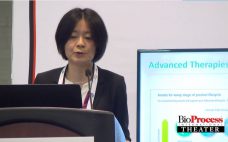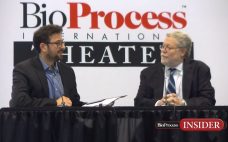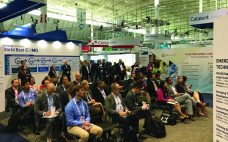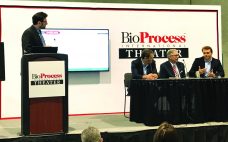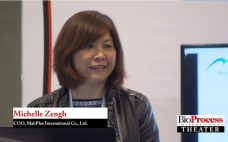Early stage development of biological unit operations is critical to ensuring an efficient and robust commercially viable process. Often, the types of experiments required in early stage development are arduous tasks that require extensive testing of different critical process parameters, filters, and other essential production components. Such testing inherently produces massive amounts of data that must be carefully analyzed. To streamline the development process and optimize operational efficiency, PendoTECH has developed a full offering of control systems specifically designed for…
2018
Efficient Bioprocess Development with Online Analytics and Data Management
As an engineering company, we are optimizing and developing new technologies for more efficiency in bioprocessing. Building on over 25 years of experience in online analytics, information processing, and automation technology, we aim to be the trusted technology provider for optimized workflows through automated sampling and process information management. Who We Are Securecell emerged in 2009 from the company Biospectra, which was founded as a spin-off from ETH Zürich in 1992. Ever since, development of online analytic solutions for bioprocess…
Acidic IgM Purification with a New Anion Exchange Resin
IgM antibodies are one of the fastest growing groups of diagnostic and therapeutic candidates. Unlike IgGs, IgMs cannot be purified by affinity chromatography due to their physiochemical properties. The large size of IgMs presents an additional purification challenge. Bio-Rad has developed a new strong anion exchange (AEX) resin — Nuvia HP-Q — to overcome the multiple issues faced when purifying large biomolecules. We show the purification of an acidic IgM antibody with capture purification using Nuvia HP-Q and polish purification…
A Platform Production Process for Manufacturing Viral Vector and Vaccine Therapeutics Using Vero Cells
Yan Zhi, program design technical lead, Fujifilm Diosynth Biotechnologies Fujifilm Diosynth Biotechnologies (FDB) is a world-leading contract development and manufacturing organization (CDMO) with over 25 years of experience using biologicals and more than 310 projects including six licenses. Production sites are located in North Carolina and Texas. In Texas, the flexible biomanufacturing facility can handle production from preclinical to current good manufacturing practices (CGMP) commercial manufacturing. Facilities and capabilities include state-of-the-art process development; mobile cleanroom (MCR) technology with fully segregated…
BioProcess Insider BPI Theater @ BIO 2018 Interviews – Tuesday
BioProcess Insider brings the news as it breaks. At the BPI Theater @BIO, editor Dan Stanton conducted a series of interviews live on stage to report on the latest movements in the biomanufacturing industry to start each busy day of dealmaking in Boston. Below we summarize his DAY ONE conversations with a number of biopharmaceutical executives on Tuesday 5 June 2018. You can watch the full interviews online at www.bioprocessintl.com/BIO-Theater-2018. Andy Topping, Chief Scientific Officer, Fujifilm Diosynth Biotechnologies Gene therapies show…
Manufacturing Automation for Patient-Scale Cell Therapies
Nina Bauer, associate director of autologous cell therapy commercial development, Lonza Pharma and Biotech Lonza Emerging Technologies is focusing on cell and gene therapies. Lonza now has expertise in different cell and vector types, constructs, process and assay development, and platform technologies for both clinical and commercial manufacturing. This includes taking a concept through commercial manufacturing. Lonza just opened a site in Houston, TX, and another in the Netherlands, as well as partnering with Nikon in the Asian market. Cell…
Acoustic Cell Processing: An Innovation in Cell-Therapy Manufacturing
Richard Grant, chief product officer, FloDesign FloDesign is experimenting with applications of acoustics to cell-therapy manufacturing. An electric transducer is attached to a closed-flow system and generates forward propagating waves that are reflected as backward propagating waves. This sets up three-dimensional standing waves within the cell (flow) chamber. When cells enter the flow channel, acoustic forces cause then to cluster within the nodes of those standing waves, ultimately settling out through enhanced gravitational means. Acoustic cell processing is scalable and…
Therapeutic Modalities: Business and Manufacturing Strategies Influencing Decisions to Develop One Therapy Type Rather Than Another
Moderator Patricia Seymour, with John Lee, Michael Kaufman, Jennifer Michaelson, and Weichang Zhou Following introductions of the panelists and their companies’ technologies, moderator Patricia Seymour began the discussion about challenges related to choosing different modalities and addressing related manufacturing concerns. Targeting Modalities Michaelson began by describing how Cullinan Oncology selects its targets and modalities, how it approaches those early phase decisions, and what its primary driver is to get into the clinic as quickly as possible. She talked about challenges…
Feeding the Demand for Cell and Gene Therapy Production
Moderator Dan Stanton, with Ohad Karnieli, Alan Moore, and David Brindley Moderator Dan Stanton introduced the second roundtable of Tuesday morning by commenting on the recent spate of approvals for CAR-T cell and gene therapies. With large biopharmaceutical and biotechnology companies devoting scientists and funds toward these next-generation therapies, contract manufacturing organizations (CMOs) also are investing in opportunities to expand capacity and expertise. As the panelists introduced themselves, they raised two key points for discussion: The contracting model for advanced…
The Development of a Next Generation Antibody–Drug Conjugate (ADC)
Michelle Zengh, chief operating officer, MabPlex International Company Ltd. MabPlex presents a complete solution from gene cloning to antibody–drug conjugate (ADC) fill–finish with a timeline from gene cloning to an investigational new drug application (IND) in 22 months. The company has facilities in San Diego and in China. It can perform cloning and high-yield stable cell-line development, process development and scale-up, CGMP quality and kilogram-scale monoclonal antibody (MAb) and payload manufacturing, large-scale conjugation (150–500 L), large-scale purification, formulation, and fill–finish.…



